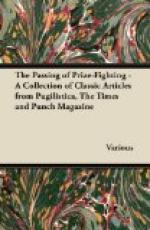ISABELLA (hotly).
“Love rides upon a thought,
And stays not dully to inquire the
way,
But right o’erleaps the fence
unto the goal.”
To appreciate the splendour of this image, the reader must conceive Love booted and spurred, mounted upon a thought, saddled and bridled. He starts. Yo-hoiks! what a pace! He stops not to “inquire the way”—whether he is to take the first turning to the right, or the second to the left—but on, on he rushes, clears the fence cleverly, and wins by a dozen lengths!
What soul, what mastery, what poetical skill is here! We triumphantly put forth this passage as an instance of the sublime art of sinking in poetry not to be matched by Dibdin Pitt or Jacob Jones. Love is sublimed to a jockey, Thought promoted to a race-horse!—“Magnificent!”
But splendid as this is, Mr. Stephens can make the force of bathos go a little further. The passage continues ("a pause” intervening, to allow breathing ime, after the splitting pace with which Love has been riding upon Thought) thus:—
“Are your lips free? A smile
will make no noise.
What ignorance! So! Well! I’ll
to breakfast straight!”
Again:—
ISABELLA. “Ha!
ha! These forms are air—mere counterfeits
Of my imaginous heart, as are
the whirling
Wainscot and trembling floor!”
The idea of transferring the seat of imagination from the head to the heart, and causing it to exhibit the wainscot in a pirouette, and the floor in an ague, is highly Shakesperesque, and, as the Courier is made to say at page 3 of the Opinions, “is worthy of the best days of that noble school of dramatic literature in which Mr. Stephens has so successfully studied.”
This well-deserved praise—the success with which the author has studied, in a school, the models of which were human feelings and nature,—we have yet to illustrate from other passages. Mr. Stephens evinces his full acquaintance with Nature by a familiarity with her convulsions: whirlwinds, thunder, lightning, earthquakes, and volcanoes—are this gentleman’s playthings. When, for instance, Rupert is going to be gallant to Queen Isabella, she exclaims:—
“Dire lightnings! Scoundrel! Help!”
Martinuzzi conveys a wish for his nobles to laugh—an order for a sort of court cachinnation—in these pretty terms:—
“Blow it about, ye opposite
winds of heaven,
Till the loud chorus of derision shake
The world with laughter!”
When he feels uncomfortable at something he is told in the first act, the Cardinal complains thus:—
“Ha! earthquakes quiver in my flesh!”
which the Britannia is so good as to tell us is superior to Byron; while the Morning Herald kindly remarks, that “a more vigorous and expressive line was never penned. In five words it illustrates the fiercest passions of humanity by the direst convulsion of nature:” (Opinions, p. 7) a criticism which illustrates the fiercest throes of nonsense, by the direst convulsions of ignorance.




